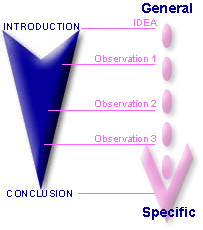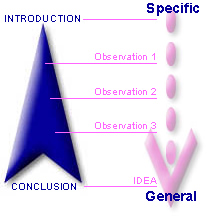
Deductive Reasoning — from General to Specific

Inductive Reasoning — from Specific to General
What Is Inductive Bible Study?
Inductive Bible Study involves the use of inductive reasoning to study the Bible. It includes the observation of evidence, the examination of evidence, and a conclusion based upon the evidence. Inductive goes from specific to general. In this way, one would observe or examine the evidence, take notes, and draw a conclusion.
On the other hand...
Deductive goes from general to specific. Perhaps you have heard of Deductive Reasoning before. The fictional character, Sherlock Holmes, used deductive reasoning to solve mysteries. He was very successful and there is nothing wrong with deductive reasoning, but it is not recommended for Bible Study.
Why Study Inductively?
Deductive Reasoning begins with a hypothesis (fancy word meaning to conclude by guessing)or an IDEA. After the hypothesis has been made, one gathers evidence to prove one's point. If the hypothesis is correct, the evidence will support it. If the hypothesis is wrong, the evidence won't support it. We all use deductive reasoning.
Children are taught in school that scientists use The Scientific Method to learn. It is deductive in nature — it begins with a hypothesis like, "Air is a gas" (a general idea). Then, evidence is gathered to prove that air is a gas, or more accurately, a blend of gasses. The evidence gathering process usually involves a series of tests, or observations, to prove that "Air is a gas." Does it act like a gas? Does it smell like a gas? (the specific part) And, so on.
The answers to these questions may not necessarily determine whether or not the hypothesis is true. For instance, if one asked whether "air" smelled like a gas, the answer would be no. It has no odor. Some gasses have odor where others do not. Yet, if this was the ONLY question asked about "air", then one might be led to conclude that "air" is not a gas.
In the area of Bible study, one can fall into the same trap; many do. For example, using deductive reasoning (general to specific) in Bible study would be like making a hypothesis that states "money is evil." Then, one would have to gather evidence to prove that "money is evil." In the Bible in the book of 1st Timothy chapter 6, verse 10 reads, "For the love of money is a root of all sorts of evil, and some by longing for it have wandered away from the faith, and pierced themselves with many a pang." This could be taken out of context by simply seeing the words money and evil, and re-reading it in such a way that changes the verse to look something like "...money is ... evil...".
But, this is absolutely NOT what this passage teaches. First, by using the passage this way is taking the phrase out of its context. Yet, if one has made up his mind that "money is evil", this might seem to be "proof" enough. This is the danger of deductive Bible Study.
The inductive method says that one will study, observe, and gather evidence (the specific part) on whatever topic and then draw conclusions(the general part) based on the observations. This is a much stronger way to establish truth than any other method of Bible Study.
By using inductive reasoning with the same passage, we would take the whole context of the passage. It says that the love of money is the root of all sorts of evil. Does this mean that money is evil? No. What then is evil? The love of money is the root of all sorts of evil.
So, the deductive process uses a series of observations to prove whether the hypothesis or idea is true or not. The IDEA is stated before the observations are made and, hence the conclusion is a statement of whether the idea is true or not. The inductive process uses the process of deduction at every observation. But, unlike deduction, the inductive process states the IDEA after the observations are made. In this way, each observation leads to a new discovery of truth.
 |
|